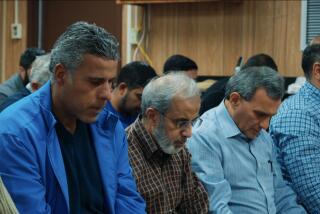Is It a Mosque or a State? A Boy Forces Pakistan to Debate Identity : Politicians are holding their tongues, lest they antagonize the religious right.
LAHORE, PAKISTAN â Not since the Salman Rushdie protests in 1989 has this Pakistani city been gripped by such an emotional religious case.
The signs plastered throughout the town of Gujranwala read: âAny one who blasphemes against the prophet should be hanged in public.â For months, dozens of Muslim fundamentalists staged angry protests outside the townâs courthouse, and now they have set upon this ancient walled city. The maulvis of Gujranwala are demanding that a 12-year-old boy and two others be hanged for allegedly defiling the name of the prophet and writing derogatory phrases on the wall of a mosque.
At the center of the protests is Salamat Masih, a gangly young Christian accused of blasphemy--a charge that carries a mandatory death sentence. None of Salamatâs accusers has yet to say what he wrote, and, in any case, they have since erased the evidence. Defense lawyers deny the boy could have written anything: Salamat is totally illiterate.
The case was recently transferred to Lahore, where his lawyers think Salamat will receive a fairer trial. But when charges against the three were framed, 35 maulvis protested outside the courthouse in an attempt to scare the judge. The trial is set to begin Monday.
Until recently, politicians, including Prime Minister Benazir Bhutto, withheld comment on the case, lest they antagonize the religious right. The countryâs law minister has sent the blasphemy law to the Islamic Ideology Council for review, concerned that it has been used to prevent the expression of religious beliefs. A spokesman for Bhutto said itâs likely the law will be modified. A decision is expected in less than a month.
During preliminary hearings, Salamat needed a police escort to repel hostilecrowds and safely enter the court in Gujranwala, where protesters had crowded the galleries to intimidate the judge. In the past two years, three people accused of blasphemy have been killed by fanatics while awaiting trial.
Since its founding in 1947, Pakistan has struggled to define what it means to be a Muslim state. âFather of the Nationâ Mohammed Ali Jinnah was not particularly religious, but it was he more than anyone who insisted on the creation of Muslim Pakistan. Zulfikar Ali Bhutto, Pakistanâs first elected leader, was known for his modernism--a practicing Muslim, his political outlook was secular.
Nonetheless, while he was prime minister, from 1973 to 1977, he caved in to the mullahs and banned alcohol. The man who toppled him, Gen. Mohammad Zia ul-Haq, completely changed the 1973 constitution to accord with the Sharia (Islamic Law)--something many politicians are still trying to undo.
Pakistanâs blasphemy laws are as extreme as those in Iran and Saudi Arabia. In 1991, Nawaz Sharifâs government conceded to Pakistanâs religious parties and made death the mandatory punishment for blasphemy, though there is no mention of such a punishment in the Koran.
Ironically, Muslim religious parties have always done poorly in Pakistani elections. In last Octoberâs elections, they won only 3% of the vote and fewer than 10 of the 217 seats in the National Assembly.
But these Islamic parties continue to have a disproportionate influence on public perceptions. They are extremely well-organized, often using the mullahs to whip up emotional support for a cause by preaching in mosques across the country. Politicians fear they will be labeled un-Islamic if they donât agree.
For this reason, only human-rights activists have come to Salamatâs aid. The Human Rights Commission of Pakistan took up the boyâs cause after his appointed lawyer, a Muslim, received threats from right-wing religious groups and quit the case.
Hundreds of Pakistanis, most of them religious minorities, have been jailed on charges of blasphemy since 1986, when Zia increased the punishment to life imprisonment or death. In the past two years, two people have been found guilty of blasphemy and sentenced to death. They are awaiting their appeals.
At the root of most of these cases are land disputes or personal jealousies. Evidence is often circumstantial, and the prosecutors rely on one personâs word against anotherâs--often all it takes to get a conviction in blasphemy cases.
After spending six months behind bars, Salamat was released on bail late last year. Sitting in his lawyerâs office, Salamat said he had been accused of blasphemy because the Muslims from his village want to force the Christians to leave the area. In Pakistan, there are an estimated 5 million Christians, who make up less than 1% of the population. Generally, they represent the poorest class and are looked down on by local Muslims.
âWe already had some enmity with those people,â said Salamat, who used to herd buffalo for his family. âThey just wanted an excuse to get back at us.â
Salamat, who appears oblivious to the punishment he might face, was accused of blasphemy last May after he had a fight with the 8-year-old son of a prominent Muslim family living near his village.
âIt started over some pigeons. The boys caught my pigeons, and they didnât want to give them back to me,â he recalled. âThe little boy with whom I had a fight said he saw me write on the mosque.â
True or not, Salamat Masih may become another victim of Pakistanâs inability to find a working relationship between mosque and state.
More to Read
Sign up for Essential California
The most important California stories and recommendations in your inbox every morning.
You may occasionally receive promotional content from the Los Angeles Times.










